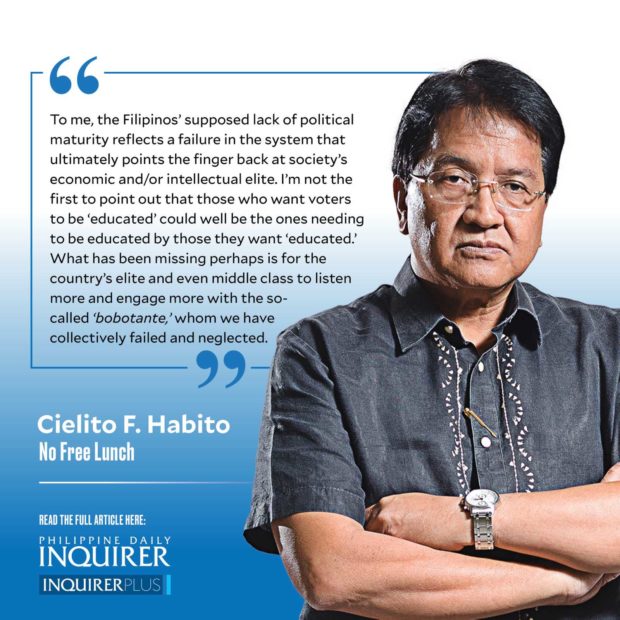Educated by the voters
I always feel discomfort when I hear talk about the need for “voter education,” usually in the context of lamenting the nature of the candidates who tend to get the strongest support from the Filipino voting public. We hear terms like “bobotante” and “tangang masa” in such conversations, especially now as we again prepare to choose new leaders in 2022.
There’s no denying that we’ve seen elected into office too many people with reputations for vote buying, thievery, plunder, immorality, and even murder; show business or sports personalities and other public celebrities with no known qualifications for governance; and even returning officials with past records of incompetence and nonperformance. A quote attributed to former Singapore leader Lee Kuan Yew made the rounds in social media years ago, where he supposedly called Filipinos “stupid” for perennially voting bad leaders into office.
Calls for “voter education” strike me as presumptuous, even bordering on arrogance. To me, the Filipinos’ supposed lack of political maturity reflects a failure in the system that ultimately points the finger back at society’s economic and/or intellectual elite. I’m not the first to point out that those who want voters to be “educated” could well be the ones needing to be educated by those they want “educated.” What has been missing perhaps is for the country’s elite and even middle class to listen more and engage more with the so-called “bobotante,” whom we have collectively failed and neglected. After all, how they cast their votes would have a legitimate motivation behind it.
For some, it is persistent poverty that leads them to keep looking for leaders who can promise immediate relief—including wads of cash and promises of more to come. That is one of the strong attractions of the candidate with whom many seem to have fallen for the yarn that once elected, he will give away the immense riches their family amassed while in power. It is said that many in our elite actually prefer to perpetuate widespread poverty in our midst, appalling as that may sound, because it is through the patronage relationships it fosters by which they maintain their grip on power.
For thinking voters with a longer perspective, the motivation could be a long-simmering dissatisfaction with the existing order, and anyone who sounds like he/she can deliver drastic change would attract their support. Seeing little improvement in their lives across various presidencies, it’s natural for common people to embrace leaders who break out of the familiar mold. But this one is not just about poor and less educated voters wanting to change the power balance in our society, in the hope of better lives for themselves. Let’s not forget that the current leader many of us love to hate found his strongest support base from the ABC classes of voters and not the bottom ones, seduced by the promise of change, not knowing that it was going to happen in the wrong direction.
“What we see during elections,” a writer once put it, “is an accumulation of the collective resentment, frustration, and even anger of many Filipinos from past years or even decades.” It stems from the failure of society’s political and economic elite to sufficiently uplift the lives of the wide majority left farther behind as they uplifted their own. And as has now emerged, our greatest failure could have well been in education in general, and with all the cross-country evidence at hand, there is no denying this. The fact that our country has found itself at the bottom of the list of countries ranked in the Programme for International Student Assessment—worst in reading and second to worst (to the Dominican Republic) in math and science—speaks for itself. Our education failure has been a huge impediment to achieving a progressive and inclusive economy and building a strong nation. Unless we change this fast, we are condemned to more of the same for time to come.
All told, the persistent call to “educate” voters is probably misplaced. Maybe we need to be “educated” by them first, to move us all to take a direct role in shaping a better future for the nation, and not count on one leader to do it.





















